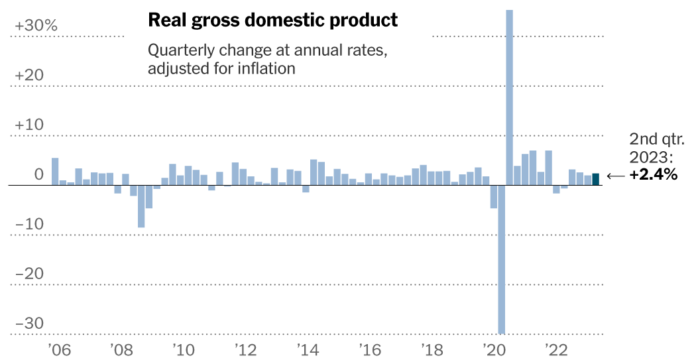Inflation has also slowed significantly. Consumer prices rose 2.6 percent in the second quarter, compared with 4.1 percent in the first quarter and more than 7 percent in the first half of last year. That has eased pressure on the Fed to raise rates further, leading some forecasters to question whether a recession is even that certain. Fed Chair Jerome H. Powell said Wednesday that central bank economists no longer expect a recession to start this year.
White House officials cited the report as evidence that President Biden’s economic policies, including investments in infrastructure and green energy, are paying off. In a blog post Thursday, the President’s Council of Economic Advisers noted that investment in manufacturing assets had contributed more than a third of a percentage point to overall GDP growth, the highest in more than four decades.
Mr Biden said in a statement the data was evidence of “bidenomics in action”.
Weiler, a manufacturer of paving and logging equipment, recently opened a 120,000-square-foot building at its headquarters in Knoxville, Iowa. The company will currently use only about a quarter of the space, said Patrick Weiler, President and CEO. But he is counting on further growth.
“We just think we have a pretty good future and it seemed like a logical investment,” he said.
Demand was strong after the pandemic, Mr. Weiler said. Now that supply chain disruptions are being fixed — the company has struggled for a while to get the motors that power its equipment — it can meet that demand. He added that federal infrastructure spending should help keep sales strong even as private demand slows.
“End-user confidence is very high because they see a lot of work ahead of them,” said Mr. Weiler.
Still, many economists believe consumers are likely to scale back spending in the second half of the year, which will slow the recovery. The savings accumulated at the beginning of the pandemic are dwindling. Credit card balances increase. And while unemployment remains low, employment growth and wage growth have slowed.
“All the tailwinds and buffers that supported consumption are no longer as strong,” said Blerina Uruci, chief U.S. economist at T. Rowe Price. “To me, it feels like this hard landing has been delayed rather than cancelled.”

















